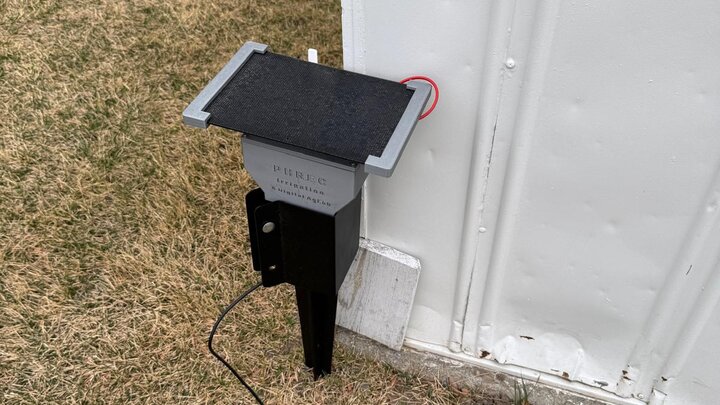Two University of Nebraska–Lincoln professors, Wei-zhen Liang and Xin Qiao, are using their education and research expertise to lead a grant-funded project aimed at aligning urban and rural water conservation efforts. Funded by the Nebraska Water Center through the U.S. Geological Survey’s 104b program, the team is developing a device to help homeowners better manage lawn irrigation, promoting more sustainable water use in urban settings. The broader project also emphasizes sustainable irrigation practices in agricultural communities and creates valuable opportunities for students to engage in hands-on, real-world research. For this project, team members were hired from Western Nebraska Community College (WNCC) bringing together diverse perspectives and providing training opportunities.
At the heart of the research is a commercially available soil moisture sensor, typically used by research and commercial farms, now being tested for its potential to help homeowners monitor soil moisture more effectively. The device offers real-time monitoring capabilities and raises awareness about water use. Designed with accessibility in mind, it features a weatherproof design, solar power, Wi-Fi connectivity, and measures soil moisture every 30 minutes. Users can view moisture levels, battery life, signal strength, and a wet/dry gauge through a connected mobile app (https://phrec-irrigation.com/#/app_intro). Currently, prototypes are being tested in the homes of team members.
In a state like Nebraska—where crop production is high and irrigation is widespread—conserving water becomes an ever-growing challenge. While it may seem simple to some, improving irrigation practices can be complex. With the help of innovative technology and community education, more people can become aware of their water usage and adopt conservation-minded habits.
Often, irrigation is only associated with agriculture. However, Qiao and Liang are working to shift that perception by adapting agricultural irrigation models for urban environments—specifically for homeowners and lawn care. Aligning mindsets between urban and rural residents creates a shared understanding of responsible water use. The ultimate goal is to encourage smarter irrigation habits across all communities.
Student involvement has been a key element of the project. Students from WNCC help with the design and gained useful experience with coding and hardware. The experience is intended to inspire the next generation of Agtech professionals.
Community engagement is also central to the initiative. Educational workshops will be hosted to introduce homeowners to the sensors and promote sustainable irrigation strategies. A survey will be available to help gather feedback and measure impact. Funding from the Nebraska Water Center has played a pivotal role in making this research possible. Their support for prototyping, testing, and public outreach has been instrumental in the project’s success.
Looking ahead, the team envisions expanding their work to reduce unnecessary irrigation and encourage practical water use among homeowners. With additional support from organizations like the Nebraska Environmental Trust and the National Science Foundation’s Excellence program, there may be opportunities to scale the technology and bring affordable systems to more communities—while continuing to offer meaningful experiences for students.
With a focus on conservation, education, and innovation, the project is already making a difference. As Xin Qiao shares:
“People care about their lawns—you drive past the neighborhood and compare, like, ‘Oh, this guy has a really good lawn.’ That peer learning part is really interesting. Also, adoption is critical, and you have to get the technology to people's hands to let them experience and try. It’s the same mindset with commercial farms. We had a grower who didn’t use soil moisture sensors before, but after working with him for two or three years, he installed 20 sensors across all his fields. That’s the kind of shift we’re excited to see.”
Liang and Qiao’s work is one of many research efforts supported by grants that are driving forward sustainable water practices across Nebraska and beyond.




